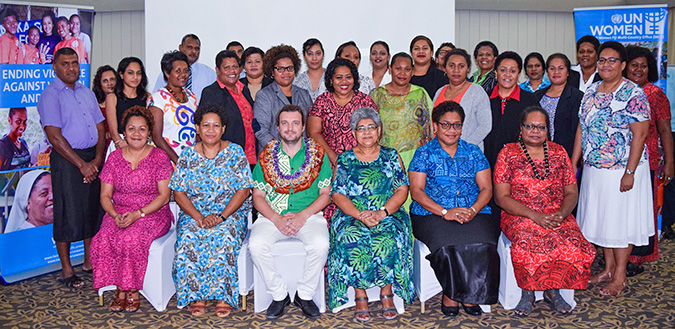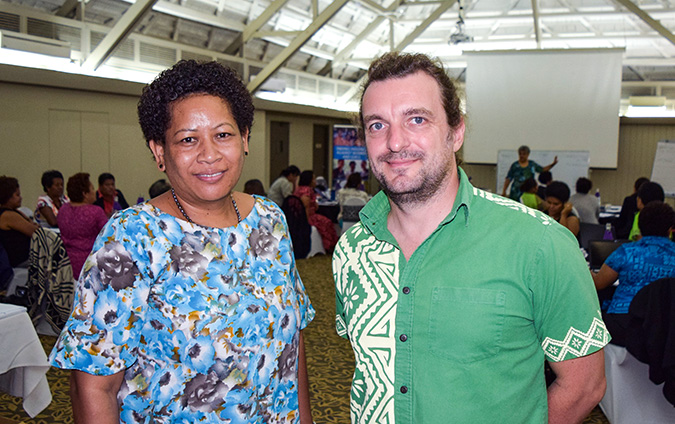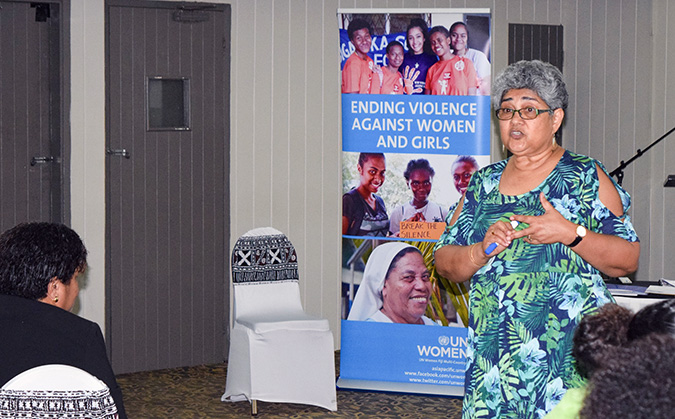Fiji rolls out protocol to better co-ordinate services for survivors of gender-based violence
Date:
Author: Jacqui Berrell
Nadi, Fiji — Survivors of gender-based violence in Fiji are to see improved services as the government rolls out a new protocol to tackle the country’s high rates of violence against women and girls by standardizing co-ordination between agencies.
“It’s about working together to provide the best services possible to help survivors of violence, and to ensure survivors are treated with the dignity, respect and care they deserve,” said Shamima Ali, Coordinator of the Fiji Women’s Crisis Centre, a key stakeholder in supporting the protocol.
“This is an historic milestone binding us together in the work on eliminating violence against women and girls,” Ali said.
The national rollout of the Fiji National Service Delivery Protocol for Responding to Cases of Gender-Based Violence began with a Pilot Training about the usage of the Protocol, being conducted by the Ministry of Women, Children and Poverty Alleviation (MWCPA), in partnership with the UN Women Fiji Multi-Country-Office (MCO).

Its national rollout is funded by the new EUR 19.8 million programme Pacific Partnership to End Violence Against Women and Girls funded primarily by the European Union (EUR 12.7 m) with targeted support from the Australian Government and UN Women.
The Protocol provides a framework on best practice and minimum standards for a survivor-centred approach to service delivery, to ensure service providers uphold a high level of ethics and safety in responding to cases of gender-based violence.
First phase of the rollout was the Pilot Training on 9-13 July 2018, where 30 participants from social services, police, legal and justice, health and other service providers, all committed to use the Protocol to ensure together they provide a coordinated, quality response to survivors of gender-based violence.
Almost two thirds of Fijian women (64 per cent) who spend time in an intimate relationship experience physical or sexual violence, or both, at the hands of their partner at some point – estimated to be about double the global average impacting two of every three women. There are many services across the country available to survivors and now these agencies are working together to streamline coordination and multi-sectoral operating procedures to improve survivor access.
In Fiji, evidence shows survivors also often hesitate to report to police or health and social services because of the stigma, the high tolerance of violence in the community, or the knowledge that the response from police and legal services is often inadequate.
Survivors often believe that even when the response is positive, services can be lacking, especially in some rural areas and smaller communities, and there are limited options for survivors to obtain support or find a safe place to escape the violence at home. A well-coordinated response across agencies responding to individual cases will improve practice and encourage more women and girls to come forward.
The Protocol was launched early 2018 after several years of development by the MWCPA in coordination with other government agencies, civil society organisations and other partners, and supported by technical advice and financial assistance from UN Women Fiji MCO.

“The Protocol provides an important platform for an agreed referral pathway for survivors accessing other services,” said Nicolas Burniat, Representative a.i. of the UN Women Fiji MCO, who officially opened the event. “It outlines service providers’ key roles and responsibilities in coordinating responses to gender-based violence across all sectors from police to health services and provides approaches to support child survivors in accordance with the Fiji Interagency Guideline on Child Abuse and Neglect.”
“The government and service providers of Fiji have been outstanding in their level of commitment and dedication in formulating, and now implementing, this interagency protocol to assist survivors of gender-based violence, which in Fiji are most commonly women and girls,” Mr. Burniat said.
“Importantly, it’s a human-rights based approach with minimum standards dedicated to providing impartial services to all diverse group including lesbian, gay, bisexual, transgender, queer and intersex (LGBTQI) identified persons and people with disabilities.”

“UN Women is pleased to collaborate with government and partners in past years to help facilitate the process of developing the Protocol, and now to continue this work by supporting the Protocol’s rollout through funding from the new Pacific Partnership to End Violence Against Women and Girls supported by the European Union and Australian Government,” he said.
The Pacific Partnership to End Violence Against Women and Girls brings together governments, civil society organisations, communities and other partners to promote gender equality, prevent violence against women and girls, and increase access to quality response services for survivors. The programme’s three outcome areas are jointly implemented through a partnership between the Pacific Community Regional Rights Resource Team, Pacific Islands Forum Secretariat and UN Women Fiji MCO.
The statistics on gender-based assaults were gathered by a 2013 national prevalence study on Violence Against Women by the Fiji Women’s Crisis Centre (FWCC)¹. It found that 61 per cent of women in Fiji who spend time in an intimate relationship suffer physical violence, while 58 per cent experience emotional violence, and 34 per cent sexual violence.
What is the purpose of the Service Delivery Protocol?
The primary purpose of the Interagency Service Delivery Protocol is to outline overall guidelines for standard operating procedures for interagency response to gender-based violence (GBV1). The Protocol ensures the provision of appropriate, timely and quality services for survivors of gender-based violence.
The Protocol is a binding agreement for frontline service providers committing them to a common set of principles and guidelines to ensure GBV survivors - most commonly women and girls - receive the best care and treatment from all sectors in a response. Furthermore, it also commits the Fiji Police, the Judiciary and the Office of Public Prosecutions, to play their role in obtaining better justice outcomes and ongoing safety and security for innocent survivors.
Development of the Service Delivery Protocol
Following a cabinet decision, the MWCPA with support from UN Women committed in earnest in 2015 to finalize development of the Protocol. A series of national consultations were held with all divisions represented. By early 2017, a first draft of the Protocol was ready. In May 2017, the MWCPA with support from UN Women invited all the partner government agencies and services providers to a national Validation Workshop, attended by more than 40 participants.
Government partners of the Protocol are: the MWCPA; the Ministry of Health and Medical Services; Fiji Police Force; the Judicial Department; the Legal Aid Commissioner; and the Ministry of iTaukei Affairs (responsible for the preservation of Fijian culture and for the economic and social development of the indigenous community). Other service-provider partners include: the Fiji Women’s Crisis Centre; Medical Services Pacific; Empower Pacific; Homes of Hope; and The Salvation Army.
The first edition of the National Service Delivery Protocol was officially launched in Suva, Fiji on 8 March 2018 on International Women’s Day.
Note
- The Protocol refers to gender-based violence (GBV) as disproportionately perpetrated against women and girls but does not exclude the very real fact that young boys and men also experience GBV.